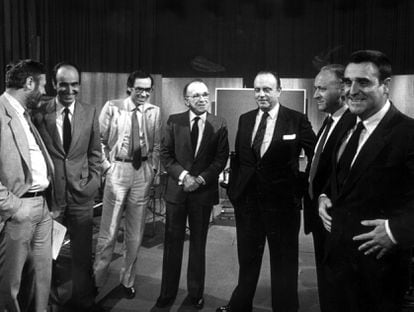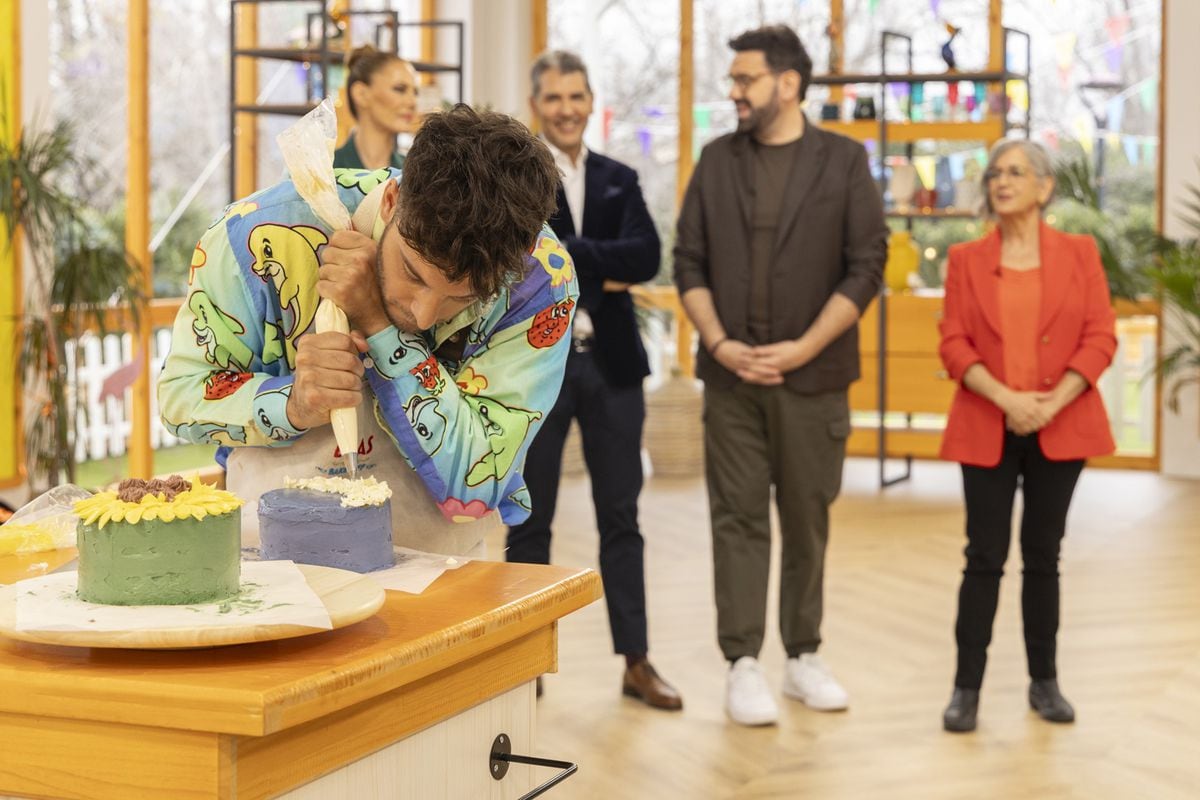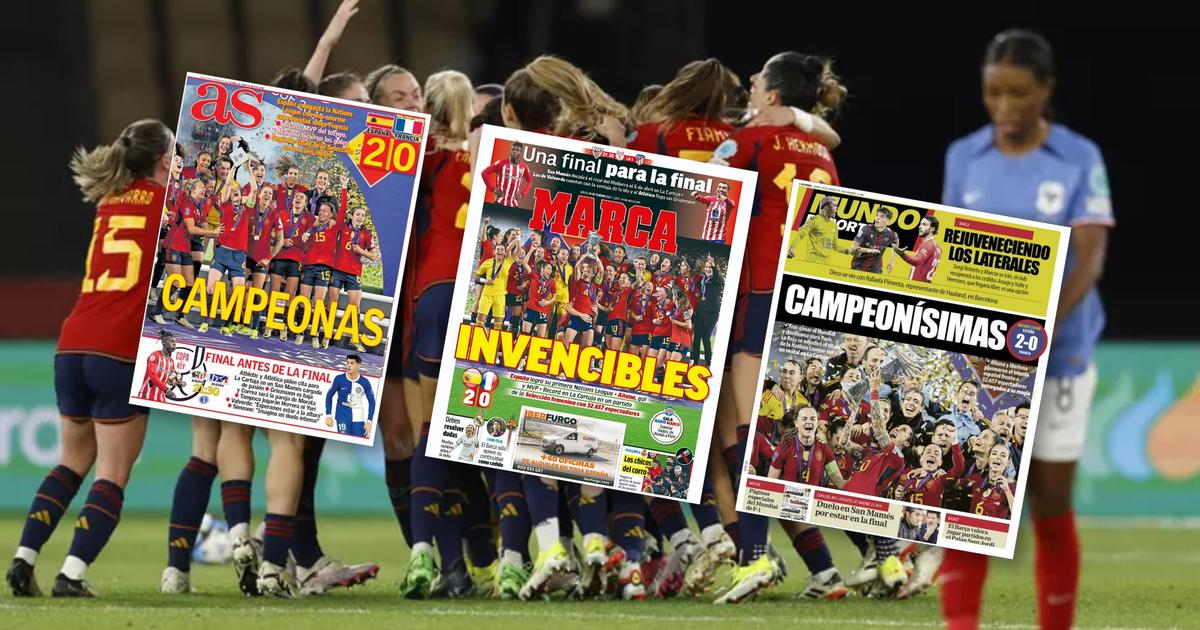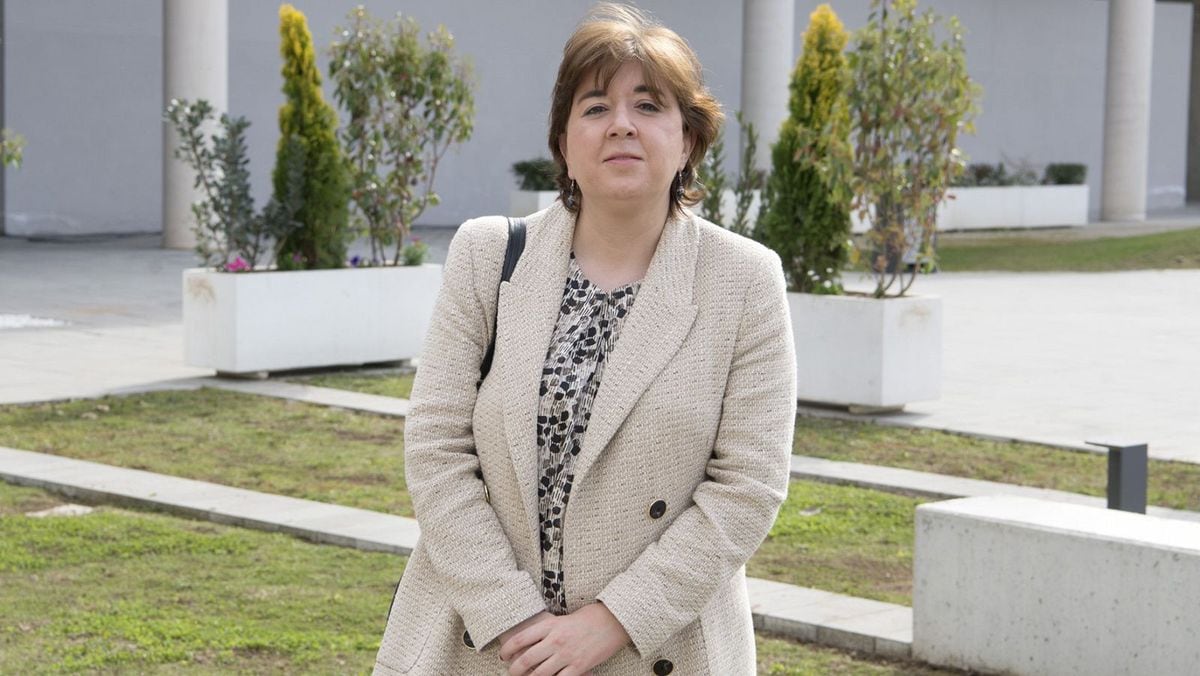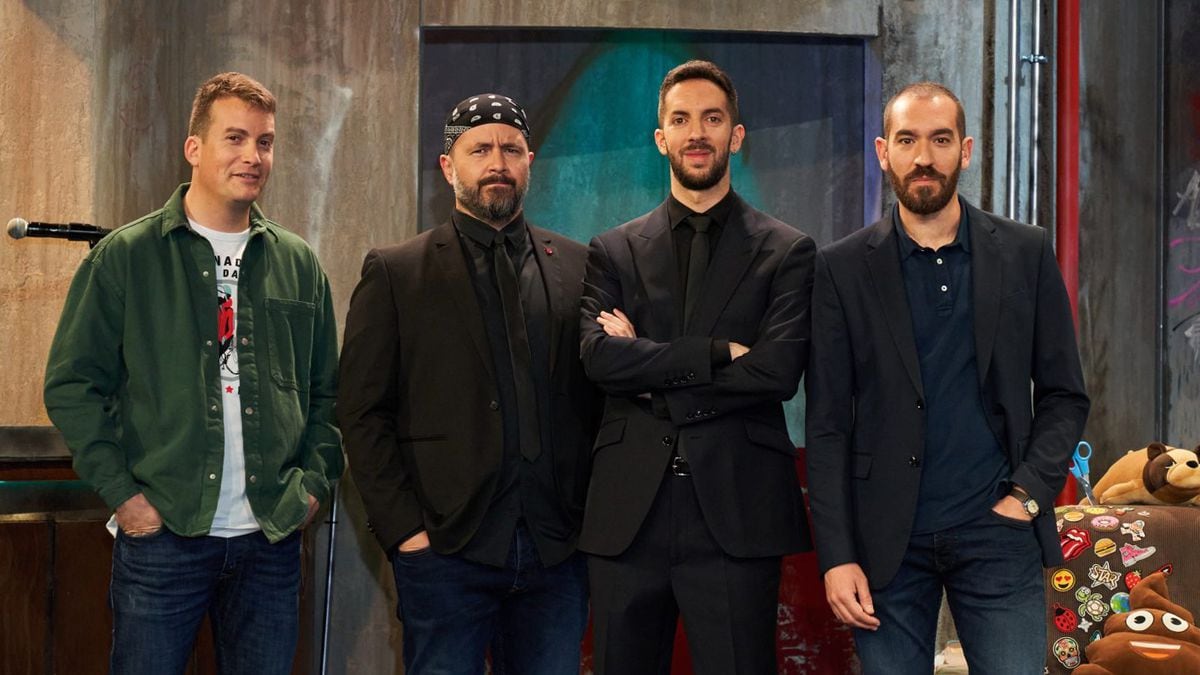In the fall of 1975, with the dictator Franco on a slow path to death, the media was seething in troubled waters.
The old had not just died;
the new had not just been born.
The panorama —the triumphs and the dangers— was described by Forges in two memorable vignettes, published in
Informaciones
, "the afternoon newspaper" financed by several bankers, with more sorrow than glory, headed by Emilio Botín, the grandfather of the current Botín.
"Today is the bullfight of journalists," said a Forgian Blasillo to his fellow sufferer, strolling through a city without buildings.
“Where do they run them?”.
"Everywhere".
They echoed a combat journalism, very minority, that suffered censorship, arrests, media closures and, many times, beatings.
Politicians of the old regime abandoning a ship that seemed to be sinking, hundreds of priests in a prison in Zamora, graffiti against the leader of the bishops, Cardinal Tarancón —”Tarancón to the wall”—, ETA killing daily and saber rattling in the barracks!
Nothing good seemed possible.
But there were journalists and media that sometimes dared to tell it, against all censorship.
The dictatorship tried to counteract them with slander.
Forges' vignette portrayed him with a very young journalist—we were all young then—perched on a piano, disheveled, bearded, skinny.
His father tells him: "Either you drop your attitude or I run around the neighborhood pretending you're a journalist."
More information
José Luis Balbín dies, legendary presenter and creator of the program 'La Clave'
Spring 1976. The dictator has been buried with great paraphernalia, but nothing seems to change.
Suddenly, King Juan Carlos, on a trip to New York (April 26, 1976), leaks to a
Newsweek
magazine reporter the opinion he deserves of his prime minister, President Arias Navarro, a Franco supporter of the first hour (he he knew him as the
Butcher of Malaga
, because of the repression he led in that province after the war): "It is an unmitigated disaster," recognized Juan Carlos I. Three months later, he elects Adolfo Suárez as president, who has been everything in the Francoist National Movement, especially director general of RTVE between 1969 and 1973. He arrives by quoting Antonio Machado, a poet who died in exile: “
Today is open / to tomorrow.
Tomorrow, to infinity.
/ Men of Spain, the past has not died, / nor is tomorrow written in yesterday”
.
The time of José Luis Balbín begins, a legendary journalist from all points of view, who died on Wednesday at the age of 81.
Asturian from Pravia —”the people of General Riego”, he liked to brag—, he has studied Law and Journalism in Madrid without financial difficulties, he befriends colleagues who were going to have outstanding careers —Rodolfo Martín Villa, Fernando Suárez, José María Otero, among others—and enters at just 22 years old to write editorials in the famous Page Three of
Pueblo,
another afternoon newspaper in Madrid, the newspaper of the vertical unions.
Soon he is your correspondent in Germany and, later, in Paris.
Since he has left Spain without doing military service, he is badly claimed as a suspected fugitive.
When he returns, by force, he suffers the first episode of ostracism.
From the left, José Luis Balbín, moderator, Miquel Roca (CiU), Alfonso Guerra (PSOE), Santiago Carrillo (PCE), Manuel Fraga (AP), Xabier Arzalluz (PNV) and Agustín Rodríguez Sahagún (CDS), shortly before one of the programs of 'La Clave' from 1982. Marisa Flórez
The key
, glory and fall
Balbín's professional career is not only
The key
, but the legendary program, with its glories and falls, marked him for life.
Always controversial, suppressed many times and reborn according to the winds of politics, the first season, in the fall of 1976, only lasted 12 weeks.
He was going to deal with the topic of the caciques.
He came back soon.
The Suárez government was convinced that a program like Balbín's, with unimaginable audiences now, was the best way to explain to the people the advantages of a democracy that was making its way with difficulty.
When Miguel Ángel Toledano commissioned Balbín to come up with a debate program — “Do you sign up?”, the director of TVE challenged him —, in Spain there were no gatherings in the media.
The key
was a novelty, then the object of jokes and slander.
Today they are plague.
The formula devised by the Asturian journalist was also extravagant.
The key
It began with the guests forming a circle, talking with their backs to the viewer, standing, unhurried, while music composed for the program by Carmelo Bernaola played.
Then came a film freely chosen by Carlos Pumares, on the theme that was to be developed later: corruption, gambling, Marxism, divorce, Church money, NATO, Opus Dei, homosexuality, drugs, abortion, books, the Constitution, witchcraft, emigrants...
The stage encouraged rest and the debate took place without haste, until the wee hours of Saturday morning.
Balbin smoked a pipe and spoke little.
The guests, who returned from dinner while the spectators enjoyed the film, did not raise their voices, did not interrupt each other, did not taunt each other.
In all the programs there used to be foreign guests of the highest level, such as Olof Palme, Noam Chomsky, Bernard-Henri Lévy, Truman Capote or Gore Vidal.
Simultaneous translation not only did not bother the viewer, but it was attractive.
The list of Spanish participants from politics, science and culture was also outstanding: Tierno Galván, Ramón Tamames, Alfonso Guerra, Julio Anguita, Santiago Carrillo, Federica Montseny, Severo Ochoa, Lidia Falcón, Gustavo Bueno, Santiago Amón and Ángel Gonzalez.
Corruption, full stop
Despite this plurality,
The key
was the great headache of the successive general directors of RTVE who endured it between 1976 and 1985, in the best sense of the word endure and sustain.
Others detested it, but did not dare to suppress it altogether.
José María Calviño did it definitively when the PSOE governed, those years with an overwhelming majority in a large part of the political institutions, especially in Congress and the Senate.
They thought they could bear the scandal of eliminating it.
The vetoed program was going to discuss corruption, with Alonso Puerta at the center of the dispute.
He had been a socialist councilor in Madrid, he had complaints to make and was later one of the founders of Izquierda Unida.
408 programs were broadcast and only a few failed to reach homes.
Predictable or loud talkers
"In today's gatherings we already know what everyone is going to say," Balbín used to complain.
“They yell, they interrupt each other, they insult each other, they deal with topics they are not experts on.”
He boasted, among all, of the one he moderated on the Social State together with Santiago Carrillo, Manuel Fraga, Alfonso Guerra, Miquel Roca, Xabier Arzalluz and Agustín Rodríguez Sahagún.
Resistant and great dialectician, of an enormous culture, which he exhibited with great sympathy —he recited verses or told jokes with portentous grace—, he knew how to overcome the tug-of-war, without giving up his independence.
It was not a bed of roses because he lived with very different CEOs, in ideology and character, such as Rafael Ansón, Jesús Sancho Rof, Fernando Arias-Salgado, Carlos Robles Piquer, Eugenio Nasarre, Fernando Castedo and José María Calviño.
With this he had lived without fanfare,
even as its director of TVE News, from where Balbín showed a special originality when he appointed Luis Carandell and Víctor Márquez Reviriego chroniclers of the Courts (Carandell in Congress, Reviriego in the Senate) to work in the manner of Wenceslao Fernández Florez.
They lasted very little.
Balbin's prestige was immense, and never declined.
Year after year he was accumulating all the prizes that are awarded to the journalistic profession.
Forty years later, walking next to him was a continuous stop.
Recognized by young and old, women and men asked him for autographs or congratulated him for having made it easier for them to grow as better citizens every weekend, thanks to a program that was a faithful thermometer of a society under construction after the long blackout of the Franco dictatorship.
You can follow EL PAÍS TELEVISIÓN on
or sign up here to receive
our weekly newsletter
.

